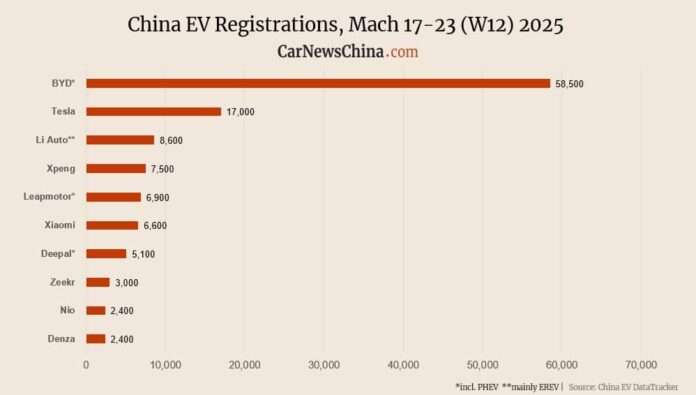In the third week of March, Nio was up 20%, Tesla was up 11%, and Xiaomi was slightly up 1.5%, while BYD was down 7% compared with the week before.
A total of 429,000 passenger cars were registered in China, up 3.2% from the previous week. The EV penetration rate was 52.2%, as 214,200 electric vehicles were registered, slightly down 0.5% from the previous week.
The weekly sales were published by Li Auto. However, Li Auto ceased publishing them last week after the China Association of Automobile Manufacturers (CAAM) “recommended” to Li Auto, media and any third parties ending it. CAAM says weekly data “undermines the industry order” and “fuels vicious competition.”
The weekly data are used by consultants, analysts, or investors to see the sales trend and forecast monthly deliveries. They also show how many cars were actually registered for road traffic, which can be later compared with automakers’ self-reported monthly deliveries, including cars for showrooms, test cars, and other uses.
China-controlled media followed CAAM’s “recommendation” to cease publishing weekly numbers. However, as CarNewsChina has been an independent source of information about the Chinese auto market since 2010, we continue publishing the data, which are provided by China EV DataTracker.
The numbers are rounded and present new energy vehicles (NEV) sales, the Chinese term for BEVs, PHEVs, and EREVs (range extenders). To be completely precise, it also includes hydrogen vehicles (FCEVs), but their sales are almost non-existent in China.
Week 12 of 2025 (W12) was between March 17 and March 23.
BYD led the week with 58,500 insurance registrations in China, down 6.8% from 62,800 units the previous week. In the first three weeks of March, BYD registered 178,700 vehicles in China.
BYD Group sold 614,679 vehicles in January and February, up 90% from 322,767 units year-over-year. The Chinese New Year holiday makes it more sense to combine January and February for a year-on-year comparison. This is explained more here.
BYD sold 4.3 million vehicles in 2024 and is expected to deliver around 5.5 million units in 2025. In April 2022, BYD ceased production of ICE-only vehicles and focused solely on EVs.

Tesla followed with 17,000 registrations, rising 11.1% from 15,300 units a week earlier. In the first three weeks of March, Tesla registered 46,100 vehicles in China.
For Tesla, this is the fourth week in a row of rising sales in China.

Li Auto recorded 8,600 registrations, up 8.9% from 7,900 units the previous week. In the first three weeks of March, Li Auto registered 23,800 vehicles in China.
Li Auto sells mainly EREV SUVs. Last year, it launched its first all-electric car, Li Mega, however, the sales were disastrous for the coffin-like vehicle. In response, Li Auto delayed the launch of another all-electric model to Q2 2025. The first all-electric SUV will be the Li Auto i8, which was already teased in spy shots.
Xpeng posted 7,500 registrations, increasing 7.1% from 7,000 units a week earlier. In the first three weeks of March, Xpeng registered 23,000 vehicles in China.
Xpeng’s monthly delivery volume has exceeded 30,000 vehicles for four consecutive months. The Mona M03 entry-level sedan has powered its deliveries, contributing about half of the sales in the last two months.
Leapmotor saw 6,900 registrations, slightly down 1.4% from 7,000 units the previous week. In the first three weeks of March, Leapmotor registered 19,800 vehicles in China.
Xiaomi reported 6,600 registrations, up 1.5% from 6,500 units the week before. In the first three weeks of March, Xiaomi registered 19,300 vehicles in China.
Nio recorded 2,400 registrations, increasing 20.0% from 2,000 units the previous week. In the first three weeks of March, Nio registered 6,300 vehicles in China.

Onvo posted 1,200 registrations, down 7.7% from 1,300 units a week earlier. In the first three weeks of March, Onvo registered 3,600 vehicles in China. Onvo sells a single model, an L60 SUV, launched in September 2024 to compete with Tesla Model Y.

Nio Group’s sales target is about 440,000 vehicles in 2024, of which Onvo should contribute half. Last year, the company delivered 220,000 vehicles.

Update: BYD sold 4.3 million vehicles in 2024 and expects to sell around 5.5 million vehicles in 2025.
Recommended for you

China EV registrations in Week 11: Nio 2,000, Xpeng 7,000, Tesla 15,300, BYD 62,800

China EV registrations in Week 10: Nio 1,900, Xpeng 8,500, Tesla 13,800, BYD 57,400

China EV registrations in Week 9: Nio 3,100, Xiaomi 6,800, Tesla 12,400, BYD 62,400


